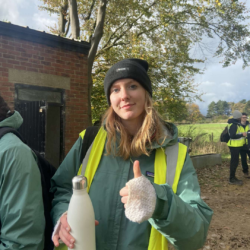How the University achieved gold status for its hedgehogs

Hedgehogs are of native origin in the UK and are unfortunately on the red list for Britain’s mammals, highlighting their vulnerability. Their decline can have an impact of the health of wider ecosystems and the environment.
Elisabeth, Student Sustainability Architect working on monitoring biodiversity here on campus, has shared how the University worked to achieve gold Hedgehog Friendly Campus status.

At the University of Leeds, we recognise our role in maintaining and monitoring biodiversity, and how we can play a creative and innovative role in protecting these spiky creatures. As a result, we’ve been involved in the Hedgehog Friendly Campus campaign since 2021; a national programme dedicated to improving hedgehog habitats in urban areas. Due to the joint efforts of the Sustainability Service, the Grounds and Gardens team, Residential Services, Student Sustainability Architects and volunteers, the University moved from a silver accreditation to gold in 2023.

So, what pushed us to gold status?
Hedgehog surveys have taken place on campus to help find identify their whereabouts in an urban setting. This has allowed us to implement monitoring techniques such as hedgehog footprint tunnels.
To get involved in monitoring our hedgehogs, as well as pollinators, birds and bats, join us in our biodiversity monitoring sessions. These will run bi-weekly on Fridays starting at 12pm. Register your place using our Eventbrite.
Hedgehog surveys outside of campus highlighted hedgehog activity in residential areas, near student accommodations and around Headingly Hill. From this, it allowed us to focus on hedgehog hotspots and ensure we maintain their homes.
Efforts made throughout 2022 in the North Hill Well wood project in Headingly included planting of Guelder Rose, to deter the attraction of badgers to the site, which are a natural predator of hedgehogs. Volunteer groups have helped to improve local food sources with log pile habitats for invertebrates as well as bug hotels. In addition, three hedgehog nesting boxes were installed on the site. Hedgehog highway portals have also been put in place so hedgehogs can safely access their habitat. An interpretation board has also been installed to update the public on history of the site as well as work completed to maintain biodiversity.
Having an official LUU hedgehog student society with where students can get stuck in and involved was one more step that helped us achieve gold.
Found a hedgehog in distress?
If you find a hedgehog, or any animal, in distress on campus, please contact the University of Leeds Estates Helpdesk (Monday- Friday 8am-5pm) on eshelp@leeds.ac.uk.
For our of hours support on campus, contact the University of Leeds Security Services using their emergency contact information. .
Alternatively, refer to the Hedgehog Friendly Campus website for more information.
Keep up to date on the latest news
-
- Follow us on Twitter: @UoL_Sus
- Follow us on Instagram: @uol_sus
- Follow us on Facebook: @UoLSustainability
- Sign up to our Sustainability newsletter
United Nations Sustainable Development Goals
 We use the United Nations Sustainable Development Goals (SDGs) as a framework to guide our activity. Our work on Student Citizenship links to all of the SDGs.
We use the United Nations Sustainable Development Goals (SDGs) as a framework to guide our activity. Our work on Student Citizenship links to all of the SDGs.
Find out more about our impact on the SDGs.
